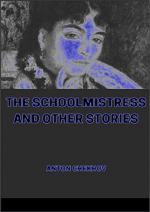His four daughters, young and pretty girls, all wearing gray dresses and with their hair done up in the same style, and their cousin, also young and attractive, with her children, were in the drawingroom. Startchenko, who knew them already, began at once begging them to sing something, and two of the young ladies spent a long time declaring they could not sing and that they had no music; then the cousin sat down to the piano, and with trembling voices, they sang a duet from “The Queen of Spades.” Again “Un Petit Verre de Clicquot” was played, and the children skipped about, beating time with their feet. And Startchenko pranced about too. Everybody laughed.
Then the children said good-night and went off to bed. The examining magistrate laughed, danced a quadrille, flirted, and kept wondering whether it was not all a dream? The kitchen of the Zemstvo hut, the heap of hay in the corner, the rustle of the beetles, the revolting poverty-stricken surroundings, the voices of the witnesses, the wind, the snow storm, the danger of being lost; and then all at once this splendid, brightly lighted room, the sounds of the piano, the lovely girls, the curly-headed children, the gay, happy laughter—such a transformation seemed to him like a fairy tale, and it seemed incredible that such transitions were possible at the distance of some two miles in the course of one hour. And dreary thoughts prevented him from enjoying himself, and he kept thinking this was not life here, but bits of life fragments, that everything here was accidental, that one could draw no conclusions from it; and he even felt sorry for these girls, who were living and would end their lives in the wilds, in a province far away from the center of culture, where nothing is accidental, but everything is in accordance with reason and law, and where, for instance, every suicide is intelligible, so that one can explain why it has happened and what is its significance in the general scheme of things. He imagined that if the life surrounding him here in the wilds were not intelligible to him, and if he did not see it, it meant that it did not exist at all.
At supper the conversation turned on Lesnitsky
“He left a wife and child,” said Startchenko. “I would forbid neurasthenics and all people whose nervous system is out of order to marry, I would deprive them of the right and possibility of multiplying their kind. To bring into the world nervous, invalid children is a crime.”
“He was an unfortunate young man,” said Von Taunitz, sighing gently and shaking his head. “What a lot one must suffer and think about before one brings oneself to take one’s own life,... a young life! Such a misfortune may happen in any family, and that is awful. It is hard to bear such a thing, insufferable....”
And all the girls listened in silence with grave faces, looking at their father. Lyzhin felt that he, too, must say something, but he couldn’t think of anything, and merely said:




